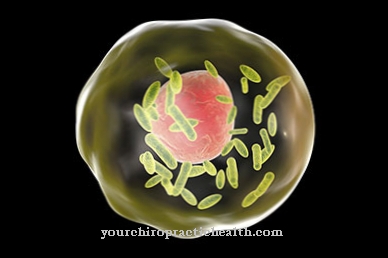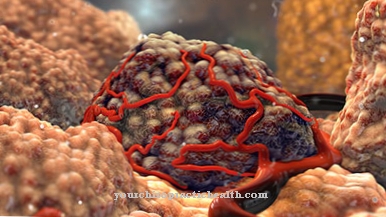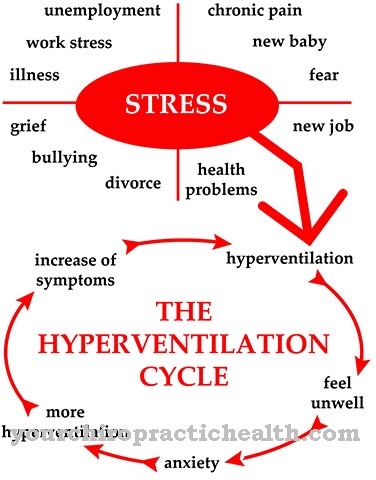If drugs or medication lead to undesirable side effects, there may be a Drug allergy, Drug allergy or Drug eruption stuck. The body reacts very sensitively to certain drug ingredients, which is shown by an allergic rash.
What is a drug allergy?

© bodiaphoto - stock.adobe.com
In principle, any drug can trigger a drug allergy. Some drugs are much more often responsible for allergic reactions. For example, an allergy occurs in ten percent of all penicillin treatments, while allergies are very rare with the heart drug digoxin.
The term drug allergy or drug allergy describes by definition the increased reaction of the immune system to the ingredients of drugs. The inflammatory skin rash, also known as drug eruption, starts from the connective tissue of the vessels and usually goes back again. The drug eruption can occur in individual parts of the body as well as distributed over the whole body.
In addition to skin reactions, any other form of allergic reaction is also possible in drug allergies, since drugs contain auxiliary substances such as flavorings and colorants, stabilizers or fillers in addition to the ingredient or active ingredient. For this reason, a drug allergy can also be traced back to the auxiliary substances it contains.
causes
The cause of the drug allergy is a dysregulation as well as an excessive defensive reaction of the immune system to certain drug ingredients or auxiliary substances.
Active ingredients in, for example, psychotropic drugs, pain relievers, antibiotics or thyroid drugs are often the cause of a drug allergy when used internally.
But even with local application, for example through local anesthesia, can be the cause of a drug allergy.
Preservatives in a drug, such as thiomersal or benzalkonium chloride, can also be the cause.
Symptoms, ailments & signs
A drug allergy can basically occur with any medication; this is more common if it is taken for a longer period of time. This can lead to various symptoms. In more severe cases, the body can react very violently shortly after ingestion, with shortness of breath and cardiovascular problems up to anaphylactic shock, which is life-threatening for those affected.
The most common form of a drug allergy is a reddish skin rash with small pustules or eczema (drug eruption) that can be very itchy, and very itchy wheals can also form on the skin (hives). In some people, the mucous membranes can swell and they react by sneezing and runny nose.
There may also be swelling and rashes around the mouth. With eye drops the eyes can react with redness and increased tearing. Gastrointestinal problems and nausea are possible, as well as headaches and a general feeling of illness.
If you have symptoms, you should always consult a doctor because it is possible that a drug can be tolerated for a long time without any problems, but the body will eventually react with an allergy. The package inserts contain information on possible allergies.
course
The severity of the symptoms of drug allergy can vary. As a result of drug therapy, allergic symptoms in the form of hives, an inflammatory rash, blisters filled with water or blood, blotchy skin redness, or contact dermatitis can occur.
The symptoms can be accompanied by a fever and poor general health. To treat drug allergy, different drugs, such as antihistamines or glucocorticoids, can be used to alleviate the symptoms. Usually the allergic reactions to a drug are quite weak.
However, the symptoms can increase with repeated contact. Then, in addition to the skin reactions, additional symptoms such as dizziness, sweating, drowsiness, nettle rash, nausea, shortness of breath, swelling of the mucous membranes can express themselves. In this case, a circulatory collapse cannot be ruled out.
Complications
In the case of a drug allergy, only very limited treatment is possible. Since the patient has an intolerance to a certain substance, this intolerance cannot be eliminated directly in most cases. Many people develop a drug allergy after taking a certain drug too often or for too long.
Here the body can react with allergic reactions to the ingredient. In most of them, however, a drug allergy can be avoided. Here, the affected person is switched to another drug. This drug should of course have the same effect, but have a different ingredient so that the drug allergy is not triggered again or even intensified.
If you continue to take the same drug, the drug allergy will not go away on its own and will in most cases get worse. Drug allergy usually results in a rash, headache, or nausea. The symptoms are very different and individual for each patient and drug. In any case, a doctor or pharmacist should be consulted in the event of a drug allergy, as these people can provide help when switching to another drug.
When should you go to the doctor?
If you have a drug allergy, you don't necessarily have to see a doctor. However, physical symptoms that are clearly related to the medication should be discussed with a doctor. In most cases, it is enough to switch to another drug to prevent further allergic reactions. Medical advice is required at the latest when the allergic reactions affect the general well-being and, for example, cause severe physical or psychological reactions.
If you are unsure, you should consult a doctor - this is advisable at the latest in the case of panic attacks or fears. If you experience severe symptoms such as swelling, edema or fever, a visit to the hospital is recommended. In order to enable rapid treatment, the responsible drug should always be carried with you.
If the symptoms are severe, the emergency doctor must be called. For example, if you have circulatory problems or a severe fever, it may be a pronounced allergic reaction that must be treated medically in any case. Before the emergency services arrive, first aid measures may have to be carried out.
Doctors & therapists in your area
Treatment & Therapy
As a rule, the diagnosis of a Drug allergy discontinued the presumably responsible drug. If the symptoms improve after discontinuation, this is considered an indication of a drug allergy. However, diagnosis is made more difficult when the person has to take multiple drugs.
Here it is seldom possible to find the origin of the drug allergy. If skin rashes occur while taking medication, a doctor should always be consulted for clarification. A classic allergy test is only partially suitable for making a diagnosis, as this test can only detect an allergy caused by anti-inflammatory drugs or antibiotics.
A diagnosis can also be made more difficult if the drug allergy mimics other diseases. It is therefore difficult to correctly assign the reactions triggered by the allergy. In addition, in this case it can also happen that an allergy remains undetected as the cause.
If the medication is discontinued after consultation with the doctor, the drug allergy usually takes a favorable course. The rash usually heals within a few days. The prognosis is somewhat less favorable if the allergic reaction of the body is very strong. A final healing here can take up to six weeks.
Outlook & forecast
Drug allergies usually have a good prognosis because they are usually triggered by certain active ingredients in a drug, e.g. B. cause a skin rash (drug eruption).
A skin rash associated with medication may be the first sign of an allergic reaction. It usually disappears quickly when the allergy-causing drug is discontinued or a switch to another combination of active ingredients takes place.
It becomes a little more difficult if the allergic reaction is stronger and your general condition deteriorates, perhaps in combination with fever, edema or swelling. Then an examination in the hospital makes sense. High fever and circulatory problems in response to medication are always a case for the emergency doctor.
The outlook is also somewhat less favorable if various drugs are taken and this makes diagnosis more difficult. Sometimes the symptoms of drug allergy are similar to other diseases and make it difficult to pinpoint the exact cause.
Lighter allergic reactions such as a skin rash usually improve a few days after stopping the allergy-inducing drug; with more severe allergic reactions, it can take several weeks for the symptoms to subside. In order to improve the prognosis, patients should inform their doctor early on if they have any intolerance reactions.
prevention
A drug allergy cannot be prevented, as the body can develop an allergy to any substance or ingredient. If allergic reactions to medicinal products have occurred in the past, it is advisable to inform the doctor about this.
The pharmacist should also be informed about self-medication of non-prescription drugs. It is also important to have an allergy passport with you in the event of a drug allergy. The incompatible drugs should be listed here and can even be life-saving in emergency situations.
Aftercare
There is no cure for a drug allergy. To avoid discomfort, the patient must stop taking the drug in question and no longer take it in the future. This will prevent the disease from recurring. This requires a high degree of personal responsibility in everyday life.
Follow-up care basically aims to address complications preventively. This happens in the context of a drug allergy by imparting knowledge as described above. This is particularly important in life-threatening situations. Since treatment takes a few minutes, such knowledge can be vital. An allergy-intolerance pass also helps if the patient is no longer responsive.
It saves lives in the truest sense of the word. Allergy sufferers can usually carry it around in their wallet. A comparison with another disease shows the fundamental difference again. If you have cancer, you will have regular follow-up examinations to prevent a new outbreak. Since drug allergy is persistent, this procedure is not effective. Protection against dangerous consequences can only be achieved by avoiding any substances.
You can do that yourself
Drug allergies cannot be prevented in every case or only to a limited extent. In principle, the body can develop an allergy to any ingredient or substance in a drug. However, this intolerance often only occurs when certain medicines have been consumed for too long or with too much intensity.
In order to avoid such allergies, medication should only be consumed by the person concerned if it is absolutely necessary. This is especially true for the excessive consumption of pain relievers. However, should an allergic reaction to a product set in, switching to a drug with different ingredients can help.
If the patient is already aware of previous allergic reactions, the attending physician should be informed about them. The pharmacist should also be informed about self-medication with non-prescription drugs.
It is also important that those affected have an allergy passport with them. The incompatible drugs or substances should be listed on these. Carrying such a passport with you can help the attending physician to take suitable countermeasures more quickly and thus save lives.


.jpg)

.jpg)



















.jpg)



